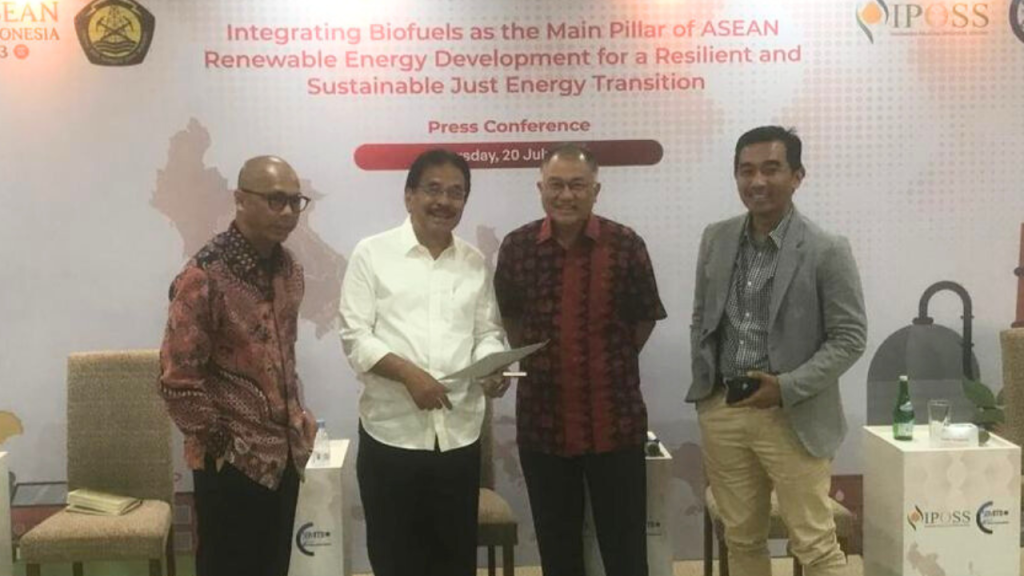Indonesia Palm Oil Strategic Studies (IPOSS) and SBM ITB support the development of biofuels as an alternative to renewable energy. Together, the two institutions conducted a policy study entitled “Navigating the Future: Opportunities, Challenges, and Strategies of Biofuel Development in South East Asia.”
IPOSS and SBM ITB see that Biofuel is an essential alternative for Indonesia and ASEAN in achieving renewable energy goals. Extensive experience in Indonesia, Malaysia, and several other ASEAN countries has proven the ability of biofuels as a sustainable solution to reduce dependence on imported fossil fuels.
“Biofuels offer a cleaner and greener substitute for conventional fossil fuels, leading to significant reductions in greenhouse gas emissions and air pollution,” said IPOSS Vice Chairman Sofyan Djalil.
The study results were launched at an international seminar entitled “Integrating Biofuels as the Main Pillar of ASEAN Renewable Energy Development for a Resilient and Sustainable Just Energy Transition” at the Westin Hotel, Jakarta, on 2 August 2023.
IPOSS, in collaboration with the ASEAN Center for Energy (ACE), the Council of Palm Oil Producing Countries (CPOC), and SBM ITB, organized this event as a side event for the ASEAN Chair in the Energy Sector under the coordination of the Senior Official Energy (BUMN) Leader for the ASEAN Chair 2023. This event was held to support the 2023 ASEAN Chairmanship agenda.
“The production of biofuels, which relies on feedstocks such as sugarcane, palm oil, and various oilseeds, has enormous potential to stimulate agricultural development and empower rural economies. In Indonesia and other ASEAN countries, where agriculture plays an important role in the economy, the development of biofuels creates new opportunities for farmers, contributes to the welfare of rural communities, and accelerates poverty reduction,” said SBM ITB Lecturer Yudo Anggoro.
As Chair of ASEAN 2023, Indonesia is committed to pushing for achieving crucial agendas in various sectors, including energy. Its primary focus is promoting a sustainable energy transition, strengthening energy independence, and increasing energy security in the region.
The international seminar event wishes explicitly to provide input in developing the ASEAN Long-Term Renewable Energy Roadmap as a strategic step in advancing the energy transition in Indonesia and ASEAN. This seminar invited speakers from policymakers, business people, and international experts from Indonesia, Malaysia, Thailand, Vietnam, and Australia for dialogue with investors, the business community, international think tanks, academics, and the media.
The seminar presented three topics. First, “Unraveling the Potential of Biofuels: Exploring Their Cleaner, Greener and Sustainable Attributes for the ASEAN Energy Transition.” Second, “Biofuels as a Contributor to the Development Economy: Assessing Their Impact on the ASEAN Economic Landscape.” And third, “Driving ASEAN’s Sustainable Future: Exploring the Collaborative Role of Biofuels in Energy Development.”
The seminar explored the significant potential of biofuels, highlighting their cleaner and greener characteristics, which offer sustainable solutions to ASEAN’s energy transition. The discussion also analyzed how the development of biofuels can contribute to economic growth and prosperity in the region, forming a collaborative environment for ASEAN countries to advance sustainable energy initiatives jointly.
“Through regional initiatives and partnerships, ASEAN countries can effectively harness the potential of biofuels and develop sustainable energy development, thereby propelling the region towards a greener and prosperous future,” said IPOSS Chair Dono Boestami.
To achieve the goals, IPOSS and SBM ITB invited stakeholders, media, and the public to join the international seminar “Integrating Biofuels as the Main Pillar of ASEAN Renewable Energy Development for a Resilient and Sustainable Just Energy Transition.”





